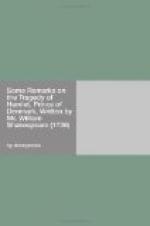There is less Time employ’d in this Tragedy, as I observed else where, than in most of our Author’s Pieces, and the Unity of Place is not much disturbed. But here give me leave to say, that the Critick’s Rules, in respect to these two Things, if they prove any Thing, prove too much; for if our Imagination will not bear a strong Imposition, surely no Play ought to be supposed to take more Time than is really employ’d in the Acting; nor should there be any Change of Place in the least. This shews the Absurdity of such Arbitrary Rules. For how would such a Genius as Shakespeare’s have been cramped had he thus fettered himself! But there is (in Truth) no Necessity for it. No Rules are of any Service in Poetry, of any kind, unless they add Beauties, which consist (in Tragedy) in an exact Conformity to Nature in the Conduct of the Characters, and in a sublimity of Sentiments and nobleness of Diction. If these two Things be well observed, tho’ often at the Expence of Unity of Time and Place, such Pieces will always please, and never suffer us to find out the little Defects in the Plot; nay it generally happens (at least Experience has shewn it frequently) that those Pieces wherein the fantastick Rules of Criticks have been kept strictly to, have been generally flat and low. We are to consider, that no Dramatick Piece can affect us but by the Delusion of our Imagination; which, to taste true and real Pleasures at such Representations, must undergo very great Impositions, even such as in Speculation seem very gross, but which are nevertheless allowed of by the strictest Criticks. In the first Place, our Understandings are never shocked at hearing all Nations, on our Stage, speak English; an Absurdity one would think that should immediately revolt us; but which is, however, absolutely necessary in all Countries where Dramatick Performances are resorted to, unless the Characters be always supposed to be of each respective Nation; as for instance, in all Shakespeare’s Historical Plays. I say, this never shocks us nor do we find any Difficulty in believing the Stage to be Rome, (or Denmark, for instance, as in this Play;) or Wilks to be Hamlet, or Booth to be a Ghost, &c. These Things, I repeat it, appear difficult in Speculation; but we find, that in Reality they do go down; and must necessarily do so, or else farewel all Dramatick Performances; for unless the Distress and Woes appear to be real (which they never can, if we do not believe we actually see the Things that are represented) it is impossible our Passions should be moved. Let any one fairly judge, if these do not seem as great Impositions on our Reason, as the Change of Place, or the Length of Time, which are found fault with in our Poet. I confess there are Bounds set to this Delusion of our Imaginations, (as there are to every Thing else in this World) for this Delusion is never perform’d in direct Defiance of our Reason; on the contrary, our Reason helps on the Deceit;




